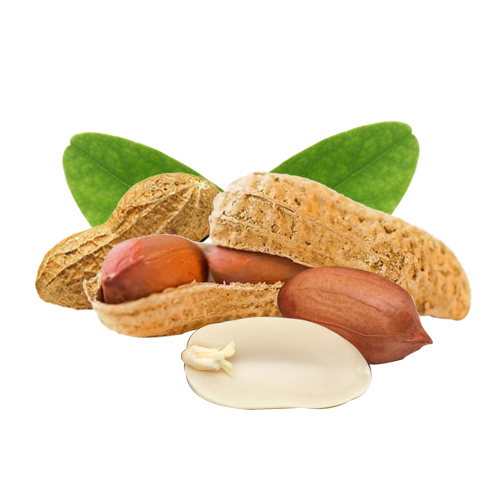Nuts & Seeds
Areca nuts Description: Areca nuts are the seeds of the fruit of areca palm.…

Peanuts
Peanut is one of the most popular nuts that are known to human since centuries. As the name implies they are not nuts, they are legumes. It belongs to Fabaceae, the legume family which includes peas, chickpeas, beans and lentils. They are also called as groundnuts, earthnuts and scientifically, Arachis hypogaea. Peanuts have a buttery and nutty taste.
How it is grown
Peanut is an annual herbaceous plant that reaches the height of 30-50cm. Peanut grows in an interesting way that it initially starts up as a flower. After pollination, the stalk of the flower elongates. Due to its weight, the stalk bends on the ground which is further buried underground. The fruit pod matures only under the ground. These pods are of 3-7cm length and contain two or three kernels. The kernels are oval shaped and off-white color in color. Each of the kernels is layered by brownish-red skin.
Where it is grown
Historically, peanuts are native to South America which was later spread all over the world by Spanish explorers. Today, it is widely cultivated in India, China, United States of America, Nigeria, Indonesia and African nations. Peanut require sandy loam soil and five months of warm weather for optimal growth. The pods can be harvested in 120-150 days after sowing.
Nutritional facts
Peanut has very good nutritional profile that includes many noteworthy healthy nutrients such as biotin, manganese, vitamins, molybdenum and protein. It is an excellent source of dietary protein and amino acids that are required for growth and development. They are also rich in calories and hence they are considered as a good source of energy. They do contain minerals like iron, potassium, magnesium, calcium, copper, selenium and zinc.
Health benefits
As the peanuts are packed with many nutrients, they offer a wide variety of health benefits as listed below:
Facts and other uses
Peanuts can be eaten in many ways like boiled, roasted, ground or even as raw. Peanuts are processed into different forms including butter, oil, flour, and flakes. Peanuts are also used in cosmetics, plastics, dyes and paints. Peanut allergy is one of the common food allergies. It is a hypersensitivity response in some individuals to the substances that contain peanuts. The symptoms include severe stomach-ache, swelling of lips and throat leading to breathing difficulty and sometimes death.
Peanut plants are highly susceptible to the fungal infection that produces aflatoxin which is a dangerous carcinogen causing stomach cancer.